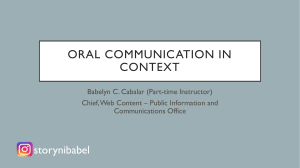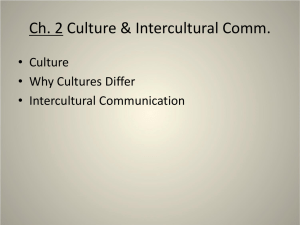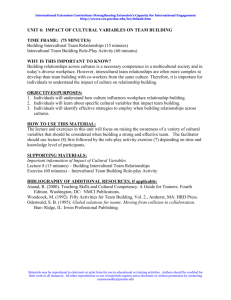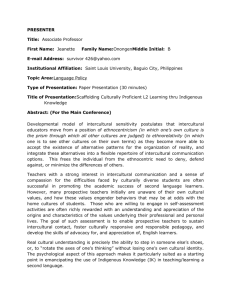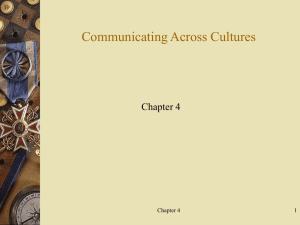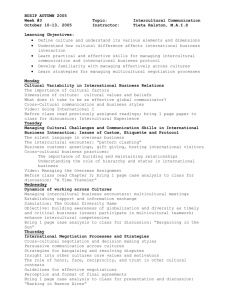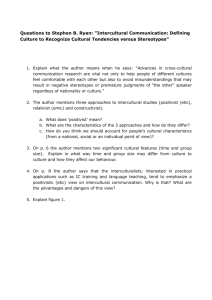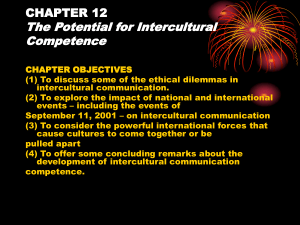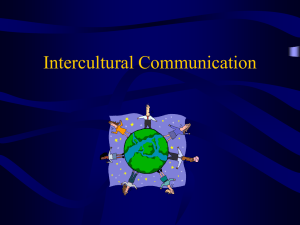Print the question cards.
advertisement
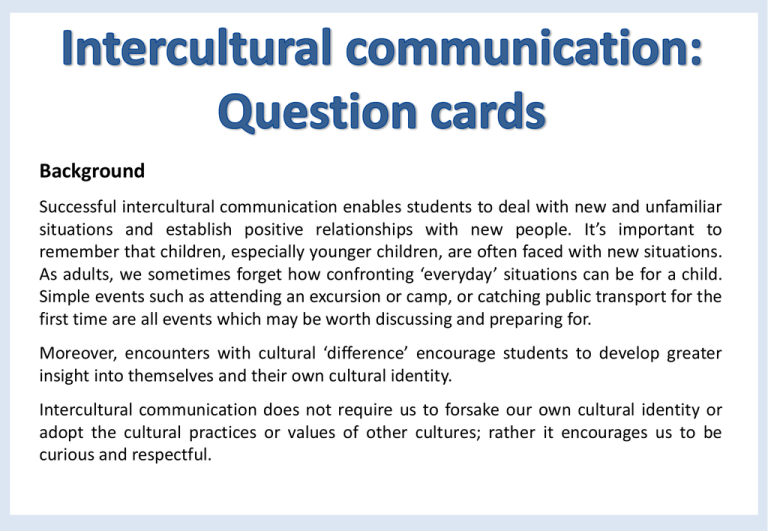
Background Successful intercultural communication enables students to deal with new and unfamiliar situations and establish positive relationships with new people. It’s important to remember that children, especially younger children, are often faced with new situations. As adults, we sometimes forget how confronting ‘everyday’ situations can be for a child. Simple events such as attending an excursion or camp, or catching public transport for the first time are all events which may be worth discussing and preparing for. Moreover, encounters with cultural ‘difference’ encourage students to develop greater insight into themselves and their own cultural identity. Intercultural communication does not require us to forsake our own cultural identity or adopt the cultural practices or values of other cultures; rather it encourages us to be curious and respectful. Intercultural communication should focus on building skills which promote an atmosphere in the classroom which allows learners to take risks in how they may think or feel about things, and to develop a sense of empathy towards others. It is much deeper and broader than developing knowledge of other countries and cultures. Intercultural communication skills are best developed in a safe and inclusive classroom where students are free to examine and reflect on their own experiences and beliefs. The purpose of these question cards is to provide practical support for the development of intercultural communication in the classroom. By using the cards, teachers can take advantage of both incidental opportunities and formal activities to critically analyse and explore the values, understandings and meanings which underlie customs, cultural products, texts, behaviours and interactions in a range of cross-curricular and everyday contexts. Incorporation of intercultural communication skills into the curriculum supports students in making connections between their own worlds and the lives and experiences of others. Funded by the Australian Government Department of Education, Employment and Workplace relations through the National Asian Languages and Studies in Schools Program 2014 © State of New South Wales, Department of Education and Communities, 2014. What do you already know? What are your expectations? What do you expect to see/smell/hear? How do you expect to feel? Where can you find accurate information or advice to help you prepare? What challenges could you face? Plans for upcoming encounters. Gathers factual knowledge. Makes no assumptions. What is happening? What are your first impressions? What aspects were you expecting? Do you find any aspects surprising or confronting? What else do you notice? Can you see any patterns or unspoken rules? Listens and watches for verbal and non-verbal cues. Withholds judgement. What is similar? What is different? How does this connect to your experiences? Can you make connections with other situations? Notices similarities. Discovers differences. How do you feel about the experience? Why do you think this way? Are you making any assumptions? Do your feelings and thoughts now differ from your first impressions? What did you learn from this? Did you learn anything about yourself? Understands what is important to self. Knows what influences own choices, beliefs and values. Analyses own reactions. Do you understand everything you saw or experienced? What else would you like to learn about the experience? Where can you find accurate information or seek advice to help you understand? Do you see any possibilities or problems? Is there another way or point of view? Is curious about other cultures. Questions why differences may exist. Asks what to do in unfamiliar situations. Checks meaning if misunderstandings occur. How did the experience make you feel? Do you think everyone would feel or act in the same way? Why may other people act differently? How could people’s experiences shape their actions? How can you respond in a supportive way? What do we have in common? Considers the feelings and reactions of others. Is willing to compromise. Develops a sense of humanity. Why is this important to others? Is this important to everyone? How does this fit with your values? How can you show your regard? What if you can’t reconcile this with your own values? Understands what is important to others. Avoids forming stereotypes. Appreciates diversity. What are the opportunities for you? Do you have any concerns or doubts? What actions are you prepared to take? Can you work through the experience in manageable steps? What strategies will support you? What might happen? Do you have a Plan B? Approaches unfamiliar situations with a sense of adventure. Participates despite apprehension. Makes informed decisions, remaining true to personal belief system.
